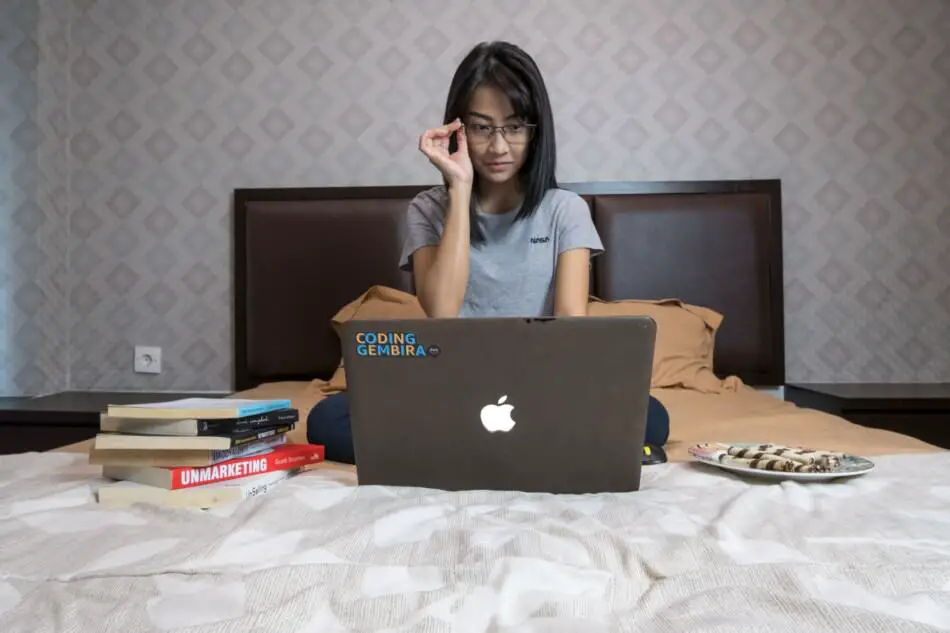People learn in different ways. The birth of a digital tribe brings new ways of learning.
The traditional classroom is now the home computer screen, making it possible to learn on your own.
You might even ask what is better: learning from others or on your own.
Being the judge of learning from others or on your own is complex. Self-learning is self-motivated, even free, and meets individual goals. Learning from others boosts self-learning and adds to everyday experiences, knowledge, and shared goals. Digital media makes ongoing learning possible.
The expert in teaching knowledge to a group is not the only way. With lots of online how-to sites, the way we were used to learn has changed. It’s not about getting a certificate, but now we can learn on an ongoing basis.
Learning happens in many ways. So what’s the best, learning from others or on your own?
What’s Better: Learning From Others Or On Your Own?
In the digital era, there is a mass of information. We have experience in many sites on learning how to write, read, cook, build, first aid, and more.
We know how we learn has changed, and it’s not mom, dad, older siblings or friends’ knowledge that matters. The internet is often the first call.
You can get the information from several sites if you want to know more about something. It is easy to type in a question, and there are many answers. When you decide to learn on your own, you have to make the right choices.
So what this means is that you have to take charge of your learning. The secret is, though, you’ll always need to involve others too.
Just imagine, there’s always a point at which you will want to discuss what you’ve learned – bounce some ideas off another person.
As much as you can sit down, read, and take in information, it is always better to talk about what you’ve learned. The sharing of information makes what you have learned a richer experience.
And you might find learning on your own and discussing this increases your understanding.
Learning on your own is not about reinventing the wheel. You can use what others know and learn more.
Researchers study how learning happens and how the brain absorbs information and say this has to do with our social, emotional, and biological states.
So how we feel and what our circumstances are can influence our learning. More so, learning is layered and happens on different levels. We learn, on the most superficial level, in two ways:
- Active – interactive and hands-on rather than a straight-forward book or online learning
- Passive – reading, listening, or watching
Learning isn’t easy. But it can be done. As we are social beings, we learn from one another. We can learn from our mistakes and also from those of others. You know the score.
-> Read Also What Is An Autodidact?
Formal Learning – Others And Self

What psychologists call the cognitive side of learning is how we learn. We know this as learning at schools, universities, and colleges.
It is also here that we get our first experience with learning which then influences us. Some of the early ideas about learning are:
- Classical Conditioning. Nobel physiologist Ivor Pavlov’s theory of learning based on association
- Operant Conditioning. American psychologist B.F. Skinner’s behaviorist leanings are based on reinforcement and punishment
- Learning Through Observation. Social psychologist Albert Bandura’s theory of learning is through direct experience and observation (A theory of social learning)
In the 1960s, Alfred Bandura changed how people thought about learning. He changed what was then thought of as learning through rewards and punishment.
Bandura found that people learn from observing others – seeing what they do and how they do this. People’s environment and how they thought and behaved influenced their learning.
Bandura’s ideas are associated with freeing up learning. Part of this process was that we didn’t all learn similarly. We also don’t all need to learn from others in a classroom and can learn on our own.
Freeing-Up Learning
Bandura said we can learn from everyday experiences and from watching others. You can learn from real life as much as from films, television, and today’s YouTube, online lectures, and simple google how-to sites.
So yes, learning is for everyone. And you don’t have to enroll in a graduate course or have a personal instructor. You can do your learning on your own.
What’s more, you don’t have to think that once you’ve done a short course, that’s it. You can learn every day for the rest of your life.
And, there’s no pressure. What you choose to learn and what suits your interests is just fine. You don’t need to learn in a classroom.
You might, however, find yourself wanting to talk to others, and that’s good too. You can learn from others and also pass on what you know.
As we free-up learning, we can start to think of life differently. The best outcome is that learning doesn’t need to stop. It depends on your motivation.
The goal of learning on your own is less about that framed certificate but rather something you want to do to develop yourself.
You know what’s good for you. And even what skills you might be lacking. And, being part of the digital era, you can learn forever!

Learning In The Digital Age
We know that the digital age has changed how we learn, what we learn, and where we get the information. We also know that we learn from others and on our own.
Many online sites, from fitness and leisure to coaching personalities, have trillions of links for personal development.
Online discussion forums are like little communities with people who think alike (or differently). You can choose what you like, learn from others, or even challenge their views.
Learning the digital-way means that a lot happens virtually and still can be face-to-face.
The digital era comes with changes that also can put you in charge of your future. So as much as you can learn on your own, you can learn from others. No doubt, learning is new, challenging, and even complex.
Whether you learn on your own, improve your skills, or start a life-long journey to explore and learn, you’ll add value when you talk about this.
As much as it’s your learning, the ideas can be shared. Learning can explode in all directions, like large crackling balls at a firework show.
Learning on your own online might be one topic at the beginning but can leak over into several others. Some even say that learning can stretch beyond the conventional block learning of a fixed curriculum.
Many theorists now see learning as interleafing – a way of adding layers to what you know. This is also how you can think of learning on your own, adding in and broadening your knowledge.
You need to, however, keep your focus and not just flick from site to site.
Effective Self Learning
We are all aware of the YouTube teaching videos, online education sites, language apps, do-it-yourself ones, and online how-to guides.
These self-learning tools are helpful when we decide not to go the conventional in-classroom route with a fixed curriculum.
As seen above, digital learning gives opportunities to anyone who wants to learn on their own. Does this sound like you? Well, you can decide what you want to learn and do it on your own.
What it takes is planning, time management, and, I suppose, energy. Just follow your interest or interests.
Learning from others might be easier unless you set goals and stay motivated. As a self-learner, you must set your objectives and develop an action plan. Make sure too that you use credible sources – for example, Google Scholar and JSTOR.
When you learn from others, they make the choices. This is on behalf of you. So, learn on your own by:
- Drawing up schedule – the daily to-do list, a weekly or monthly action plan with estimates and deadlines
- Drawing a typical plan – days of the week with 4 tasks under each and a tick box / apply what you’ve learned
Suppose you wonder how to go about this, well. In that case, there are many digital aids (mapping techniques, project plans, and calendars) online. Be aware that learning on your own can be lonely.
Also, join online social media platforms – chat with like-minded people. Group input can help.
Some sites that are friendly for self-learning are Britannica Encyclopedia, National Geographic and National Geographic for Kids, ReadWorks Science News for Students, Goodreads, and Amazon. You can also listen to podcasts.
What follows is a brief discussion on learning from others.
-> Learn more about the 7 best websites for self-learning
Learning From Others
The classroom is not out-voted, but self-learning is promoted. You can design what we want to know and learn.
When learning from others, a course outline or curriculum is used. The outcome is not usually entirely yours, but a whole classroom’s.
Learning from others can be positive based on constructive criticism. But learning from others might not suit your needs. It can be broad or not specific enough. If you learn from others, you get their experience and even know their mistakes. You can learn faster.
In business, learning from others is seen as effective. In business, the model is to learn from others and collaborate. At the same time, this should not stop you from wanting to learn on your own.
You can work together, and others can even learn from you. You can teach your skills.
Learning from others allows for group interactions and what’s known as an open mindset.
In general, learning from others also can be an eye-opener not to repeat mistakes.

Focused Learning With End Goal
Learning on your own can be lonely – no friends or colleagues. The information can be new, and you have no one to discuss this with.
So when you think about learning on your own or with others, know what you want to achieve. You have all the knowledge for learning at your fingertips.
Just think of that old saying: you’re never too old to learn. As much as we want and can learn on our own, we need others to bounce ideas off. Also, we can learn from others. That makes learning special – on your own or learning from others.
Self-Learning As Choice
Self-learning is made easier in the digital age. But is this really the best way? With almost everything covered on YouTube and how to improve your skills sites, you still can’t learn everything online or by yourself.
But, this is important, you can decide what you’d like to learn and do it on your own.
Yes, you can join the digital tribe and don’t need to be an expert. You can choose what you’d like to learn and even get some time and project management skills in the process of doing so. There are opportunities for never stopping.
The tricks for learning are the same – stay at it, work hard, repeat what you don’t understand, and voila, you’ve learned. Get yourself started.
If you’re curious enough, you can pick a topic and learn about it. Ask the right questions, and you’re bound to get the answers …and learn.
Many choices cover any topic you can think of. Mostly online learning gives quick guides, enough to stimulate your interest. The format that works best is often one that offers videos too. You can’t be a brain surgeon or nuclear physicist, though.
Learning on your own is self-directed. You’ve got it – you take the initiative.
Self-Directed Learning
Self-directed learning lets you decide what content you need and how you want to follow through with learning this. Most importantly, what you decide to learn is for your personal growth.
You might want to get better in the way you work and even learn tricks to best change your behavior.
When you learn on your own, you can do this in your time and even at your pace. There is a point, though, that you’ll feel all this learning pointless if you can’t use or even discuss it with anyone.

Learning from others is essential, even if just testing what you’ve learned. The ideas of a friend or a colleague can even make you want to learn better. You know, that moment you can say teamwork.
Researchers have found that learning on your own has a specific focus. And then learning from others brings a shift in one’s focus. This is altogether a good thing.
Learn From Others And On Your Own: Point Of Collaboration
Much of what we are taught can be self-learned. Learning on your own is exciting; for many, not having to write a test is a plus.
But can learning on your own be as effective as learning from others? Can we learn tasks on our own, or is it better to learn from others?
Some say we’re always beginners – we can learn each moment in the simplest ways. We never stop learning – by ourselves and from others.
And the most remarkable thing is, we will move from knowing a little to more but always be a beginner in any new task. That’s how it is.
We also will always learn from others. We don’t live in isolation; we are social beings. As Albert Bandura said (see the section on observation and learning), we learn by observing or looking at others.
We also learn from their choices and mistakes. On an intercultural level, learning from and about others is enriching.
-> Learn More about Self-Learning vs. Classroom Learning: Which Is Better?
Stars Of Self Learning
Stars of self-learning Nikola Tesla and Steve Jobs became famous. As you can agree, it must have been much more complicated then. It’s no longer as difficult as there are free resources and hundreds of content sites.
The plus of self-learning is choosing what to do and measuring your performance. This happens because you decide when you move on – there’s no exam or fail.
Think about it this way, learning on your own is relatively stress-free with no exams or deadlines.
Self-learning is about you and what you want to learn. You will also find that you will get to know what your interests are. An added bonus is that you will learn problem-solving skills too.
You choose what to learn from various videos, texts, and experiments. You can also join free webinars.
Are you ready to see the benefits of self- and life-long learning?
Just imagine: thirty minutes a day for 30 days can make a difference. The challenge is discipline as the information is online, in lectures, on YouTube, in books, and watching people.
The digital world is your oyster if you know what you’d like to learn. Some say it’s as simple as following your passion. For others, it’s interacting with the right people.
You can learn a language or how to play a musical instrument. You can learn from a cooking program to become a chef.
Fix a washing machine, learn photoshop, publish a book, or learn primary childcare.
Conclusion
Thinking of learning a new skill? Now’s the time. You can learn to do watercolors, tile a floor, kayak, or become a long-distance runner.
Your project management skills can be brought up to date. Learning on your own is for your personal benefit. Learning from others adds to your thinking.
Now you are ready for the change, learn about your passion, on your own and with others. It’s up to you to keep learning. Self-styled learning has a layer added when you interact with others.
So, is it better to learn from others or on your own? The answer is to be open-minded and learn all and from all.
References
- https://www.lifehack.org/853724/self-learning
- https://hbr.org/2022/05/developing-a-digital-mindset
- https://www.exed.hbs.edu/leading-digital-era/#popup curiosity about learning
- https://pll.harvard.edu/course/leading-digital-era?delta=0
- https://er.educause.edu/articles/2009/1/education-in-the-digital-age
- https://academicaffairs.arizona.edu/l2l-strategy-interleaving#:~:text=Interleaving%20is%20a%20process%20where,before%20moving%20to%20another%20topic.
- https://www.youtube.com/watch?v=vd2dtkMINIw
- https://creately.com/blog/education/self-learning-techniques-tools/#:~:text=Self%2Dlearning%20is%20an%20approach,and%20evaluate%20their%20own%20knowledge
- https://creately.com/
- https://www.quora.com/What-are-the-best-ways-to-learn-from-others
- https://www.lollydaskal.com/leadership/learn-from-others/
- https://www.youtube.com/watch?v=kIuxeeW1PLI
- https://www.youtube.com/watch?v=Td8f-wxbK8w
- https://hbr.org/2016/03/learning-to-learn
- https://www.frontiersin.org/articles/508550
- https://www.onlinemswprograms.com/social-work/theories/social-learning-theory/
- https://www.penguinrandomhouse.com/books/575116/the-new-social-learning-by-tony-bingham-and-marcia-conner/
- https://www.betterup.com/blog/self-directed-learning
- https://www.readworks.org/teacher-guide/develop-comprehension-strategies.html






